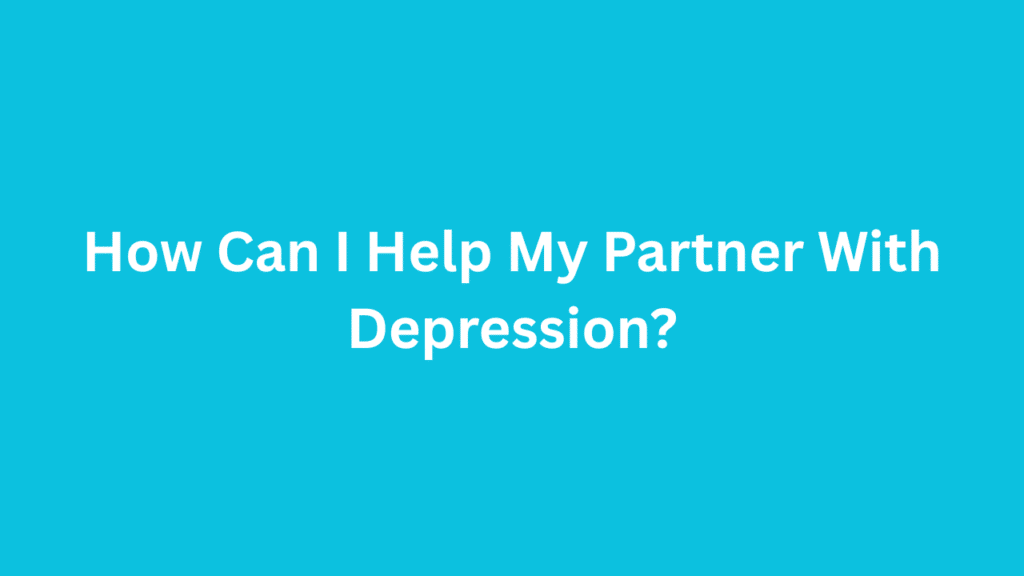When the person you love is struggling with depression, it can feel like you’re watching them disappear—slowly, silently, and helplessly. The laughter fades. The energy dies down. Their eyes don’t sparkle the same way anymore. And no matter how much you love them, you may find yourself asking:
“How can I help my partner without making it worse—or losing myself in the process?”
You’re not alone. Loving someone with depression is both a beautiful act of care and a deeply emotional challenge. But with empathy, patience, and the right tools, you can make a real difference—not by “fixing” them, but by walking beside them through the darkness.
🧠 First, Understand: What Depression Really Is
Depression is not just sadness. It’s not something your partner can “snap out of” or shake off with positive thinking. It’s a medical condition that affects:
- Mood and motivation
- Sleep and appetite
- Energy and concentration
- Self-worth and emotional regulation
Telling someone with depression to “cheer up” is like telling someone with a broken leg to “just walk it off.”
❤️ 1. Be There—Without Pressure
The most powerful thing you can offer is presence.
- Sit with them in silence if they don’t feel like talking
- Be physically near, even if they’re withdrawn
- Let them know they don’t have to pretend around you
💬 “I’m here. I’m not going anywhere. You don’t have to go through this alone.”
Sometimes, your calm presence says more than any pep talk ever could.
🗣️ 2. Learn to Listen Without Fixing
When your partner opens up, resist the urge to give solutions or advice—unless they ask for it.
Instead, try:
- “That sounds really hard. I’m so sorry you’re feeling this way.”
- “I’m here to listen, not judge.”
- “Tell me more. I want to understand.”
🧠 Listening is one of the most healing acts of love.
💊 3. Encourage Professional Help—Gently
Depression often requires therapy, medication, or both. You can’t be their therapist—and you shouldn’t try to be.
Instead of pushing, say:
- “Would you feel comfortable talking to someone about this?”
- “I’ll support you if you want to find a therapist.”
- “You don’t have to do this alone—and neither do I.”
Offer to help with research, booking appointments, or going with them. But let it be their choice.
🧹 4. Help With Daily Tasks—Without Making Them Feel Helpless
Depression can make even simple tasks—like getting out of bed or doing laundry—feel impossible.
Offer support by:
- Gently suggesting small steps (e.g., “Let’s go for a short walk together”)
- Helping with meals, chores, or errands without making a big deal
- Creating a low-stress environment at home
🧩 The goal isn’t to take over their life—it’s to remove friction so they can heal.
💬 5. Remind Them of Their Worth—Even When They Can’t See It
Depression often distorts a person’s self-image. They may feel worthless, unlovable, or like a burden.
Be the voice that reminds them:
- “You matter.”
- “I love you—even when it’s hard.”
- “You’re not a burden. I choose to be here.”
But don’t expect immediate gratitude. Often, they can’t feel the love you’re giving—yet.
⚠️ 6. Know the Signs of a Crisis
If your partner mentions self-harm, hopelessness, or not wanting to live, take it seriously.
- Ask directly: “Are you thinking about hurting yourself?”
- If the answer is yes or uncertain, contact a mental health professional, helpline, or emergency services immediately
- Don’t leave them alone if you’re concerned for their safety
🚨 It’s better to overreact than to miss a cry for help.
🧘 7. Take Care of Yourself Too
Loving someone with depression can be draining. You may feel helpless, overwhelmed, or emotionally exhausted.
- Set healthy emotional boundaries
- Talk to a therapist or join a support group
- Don’t feel guilty for taking breaks
- Keep doing things that bring you peace and joy
💡 You can’t pour from an empty cup. Caring for yourself helps you care for them better.
✨ 8. Celebrate the Small Wins
In depression, even tiny steps—like getting out of bed, taking a shower, or making a phone call—can be huge victories.
Acknowledge them:
- “I’m proud of you for today.”
- “That was brave.”
- “I see you trying. That matters.”
These affirmations help rebuild their confidence and remind them they’re not stuck forever.
💬 What Not to Say
Avoid phrases like:
- “Snap out of it.”
- “You’re overreacting.”
- “But you have so much to be happy about.”
- “Other people have it worse.”
- “If you really loved me, you’d try harder.”
Even if you mean well, these comments can make them feel ashamed, misunderstood, or more isolated.
🌈 Final Thoughts
Supporting a partner with depression isn’t easy—but it is one of the most powerful forms of love. Not through grand gestures, but through:
- Showing up
- Staying patient
- Being kind, even when it’s not returned
💬 You may not be able to save them—but you can stand beside them while they save themselves.
Your love may not cure their depression, but it can make the healing journey less lonely. And that’s a gift no words can measure.



